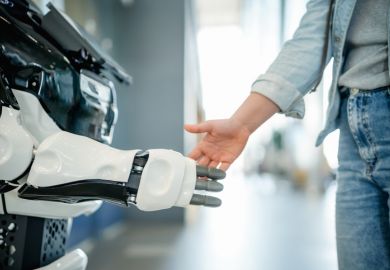The European Commission should support the creation of an artificial intelligence research institute in order to challenge the “dominance of a limited number of corporations” over the developing technology, a scientific advisory group has proposed.
Responding to a request by Margrethe Vestager, the commission’s executive vice-president, the Scientific Advice Mechanism published a series of policy recommendations on how to “facilitate the uptake” of AI in research and innovation across the European Union.
The advisory group describes AI as a “geopolitical asset”, noting that at present, most infrastructure “belongs to a small number of companies, largely in the US and China, and even public research labs depend on them for computing power”.
Establishing a European institute for AI in science would help to “rebalance the situation”, the group says. Ediras – the European Distributed Institute for AI in Science – could offer “massive high-performing computational power, a sustainable cloud infrastructure, and AI training programmes for scientists”.
According to the recommendations, the institute should receive dedicated funding through another new creation: a European AI in Science Council, or EASC, which would also fund researchers at other institutions.
Elsewhere, the Scientific Advice Mechanism encourages the EU to provide financial backing for specialised AI tools for use in scientific research, while prioritising the use of AI in areas with “major benefits for EU citizens”, such as personalised healthcare or the European Green Deal.
Other recommendations include the creation of tools to monitor the use of AI and report any misuse, such as “bio-weapon developments, fraud, hacking, deep fake, and aggressive military AI applications”.
“There is no better way to boost the uptake of AI in scientific research than asking scientists about what they need the most,” Ms Vestager said in a statement. She added that the recommendations highlighted the key needs of AI in science: “Significant funding, skills, high-quality data, computing power and, of course, guardrails to ensure we keep by the values we believe in.”
“Artificial intelligence means a revolution in research and innovation and will drive our future competitiveness,” said innovation and research commissioner Iliana Ivanova. “We need to ensure its responsible uptake by our researchers and innovators for the benefit of science but also of the economy and society as a whole.”
The recommendations come in the wake of the commission’s guidelines on the “responsible use of generative AI in research”, published in March. The guidance acknowledges the potential of the technology to “accelerat[e] scientific discovery” while urging researchers to take note of its “limitations”, among them “plagiarism, revealing sensitive information, or inherent biases in the models”.
In particular, the commission advised researchers to avoid using AI when conducting “sensitive activities that could impact other researchers or organisations”, such as the evaluation of research proposals or peer review.
Register to continue
Why register?
- Registration is free and only takes a moment
- Once registered, you can read 3 articles a month
- Sign up for our newsletter
Subscribe
Or subscribe for unlimited access to:
- Unlimited access to news, views, insights & reviews
- Digital editions
- Digital access to THE’s university and college rankings analysis
Already registered or a current subscriber?








